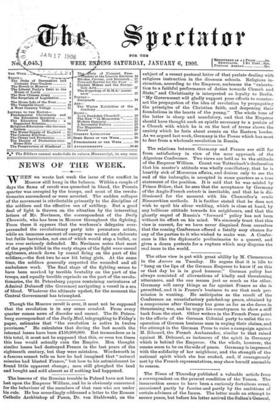The other view is put with great ability by M.
Clemenceau in the Aurore on Tuesday. He argues that it is idle to "hang on the lips of the German Emperor to know if on this or that day he is in good humour." German policy has always consisted of alternations of kindly and threatening utterances, and the one means just as much as the other. Germany will carry things as far against France as she is permitted, and it is France's business to see that such per- mission is wanting. He anticipates as the result of the Conference an unsatisfactory patched-up peace, obtained by a compromise after Germany has gone as far as she dares in threatening war, and he urges his countrymen to show a stiff back from the start. Other writers in the French Press point to the efforts of the German Colonial party to enlist the co- operation of German business men in urging their claims, and the attempt in the German Press to raise a campaign against M. Bihourd, the French Ambassador, similar to that raised against M. Delcasse, as instances of the spirit in Germany which is behind the Emperor. On the whole, however, the omens seem to be on the side of peace. Germany is impressed with the solidarity of her neighbour, and the strength of the national spirit which she has evoked, and, if courageously met by the French representatives, may show herself amenable to reason.


















































 Previous page
Previous page